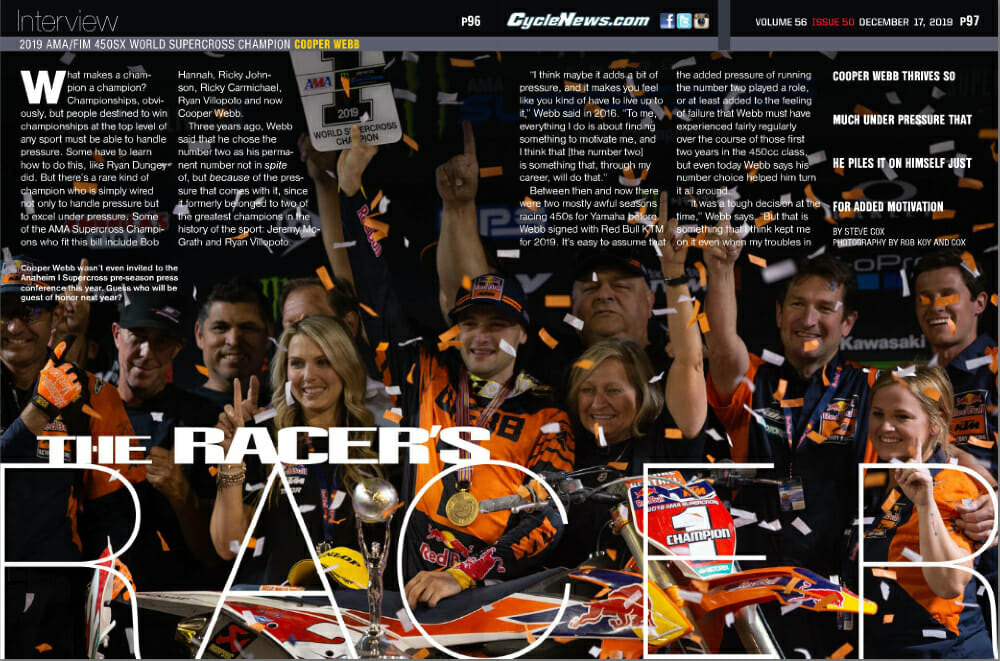Steve Cox | January 2, 2020
Cooper Webb thrives so much under pressure that he piles it on himself just for added motivation. Read more about it in the Cycle News 2019 AMA 450cc Supercross Champion Cooper Webb Interview:
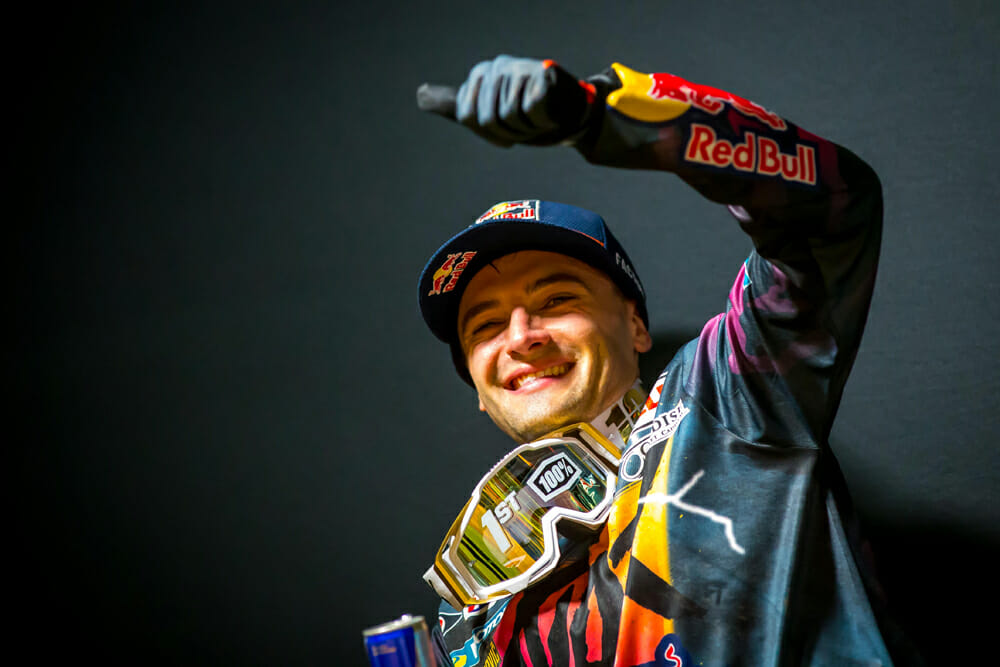 Webb says he thrives off pressure. That’s good because he’ll be under a lot of it next carrying that number-one plate.
Webb says he thrives off pressure. That’s good because he’ll be under a lot of it next carrying that number-one plate.
Photography by Rob Koy and Cox
What makes a champion a champion? Championships, obviously, but people destined to win championships at the top level of any sport must be able to handle pressure. Some have to learn how to do this, like Ryan Dungey did. But there’s a rare kind of champion who is simply wired not only to handle pressure but to excel under pressure. Some of the AMA Supercross Champions who fit this bill include Bob Hannah, Ricky Johnson, Ricky Carmichael, Ryan Villopoto, and now Cooper Webb.
Three years ago, Webb said that he chose the number two as his permanent number not in spite of, but because of the pressure that comes with it, since it formerly belonged to two of the greatest champions in the history of the sport: Jeremy McGrath and Ryan Villopoto.
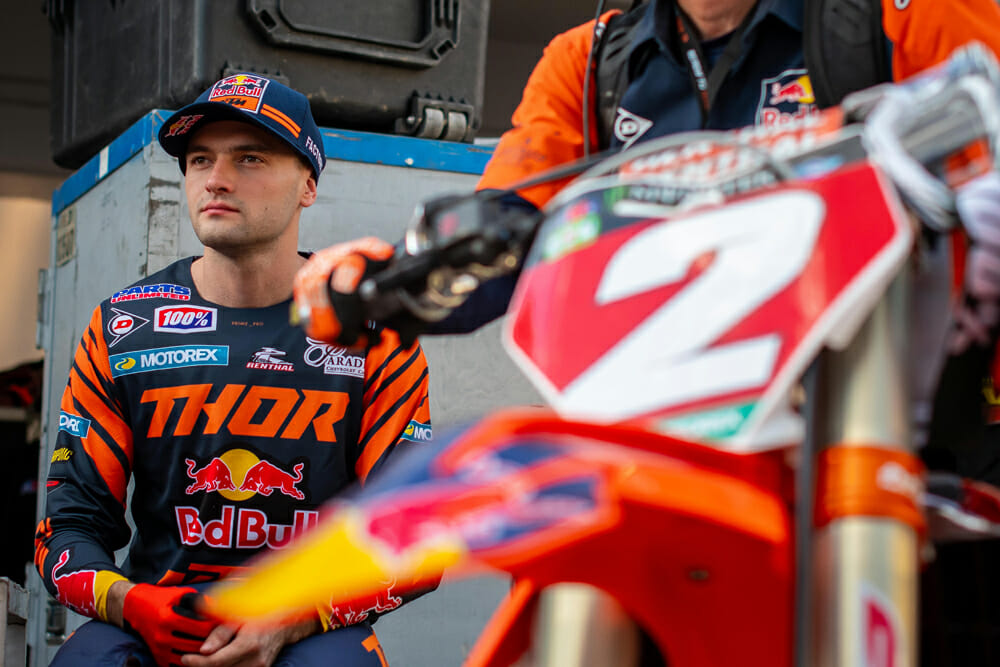
“I think maybe it adds a bit of pressure, and it makes you feel like you kind of have to live up to it,” Webb said in 2016. “To me, everything I do is about finding something to motivate me, and I think that’s something [the number two] that through my career will do that.”
Between then and now, there were two mostly awful seasons racing 450s for Yamaha before Webb signed with Red Bull KTM for 2019. It’s easy to assume that the added pressure of running the number two played a role, or at least added to the feeling of failure that Webb must have experienced fairly regularly over the course of those first two years in the 450cc class, but even today Webb says his number choice helped him turn it all around.
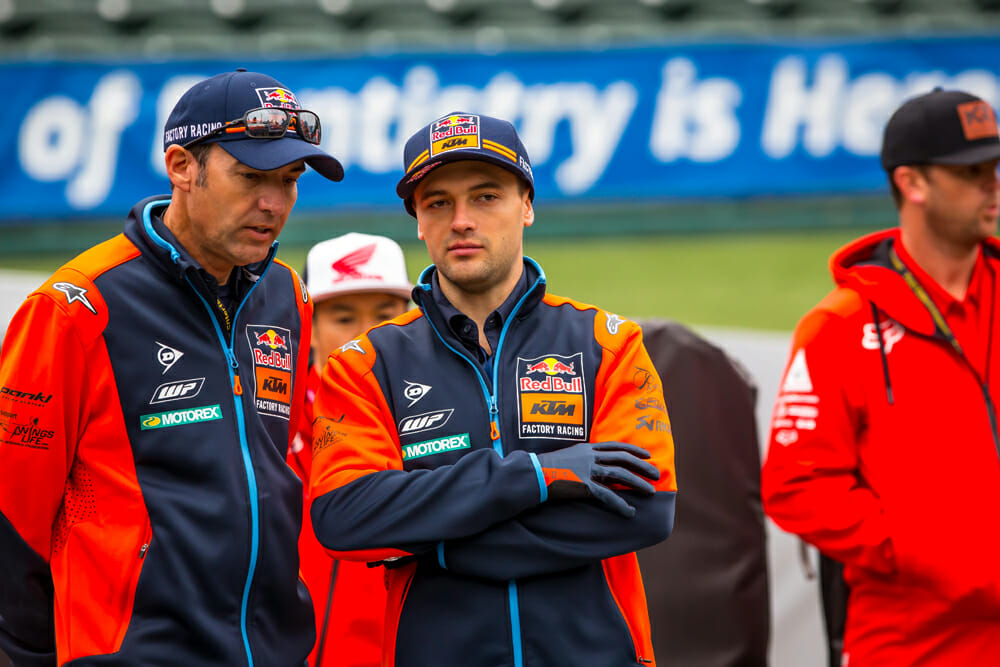
“It was a tough decision at the time,” Webb says. “But that is something that I think kept me on it even when my troubles in the 450 class hit. Obviously, there are so many reasons why you want to do well. You almost do add an extra bit of weight when you do have such an amazing number that has had amazing results. You take the lowest possible number you can get. Two of arguably the best riders in our sport have raced that number. That does come with, I wouldn’t say an expectation, but you definitely have that in the back of your mind. You want to prove that you’re worthy of running that number. At the time, a lot of it was to kind of have that little bit of, I wouldn’t say pressure, but more of a motivator to stay on it.”
And that’s a big key to success: Recognizing what works for you, and using it.
Another big key to Cooper Webb’s success is his honesty, and honesty requires confidence. He’s honest with himself, and he’s honest about himself. It’s a surprisingly rare trait in the supercross paddock, as many (or even most) racers create some level of a narrative or belief-system that relieves them of ultimate responsibility for their own failures. “It was the tires/bike/start/etc. It couldn’t be me, obviously…” If they believed they were the problem, a lot of racers would fold. They have a need to believe that they are good enough to win, and if they don’t, there must be some outside reason for it. But there’s not.
On this point, Webb is one of the few racers who, for example, will admit that he’s nervous. For example, after winning his first race of the year—the first of three main events at the Anaheim 2 Triple Crown—with a last-lap pass on Honda’s Ken Roczen, he immediately felt the pressure to back that up in the second main.
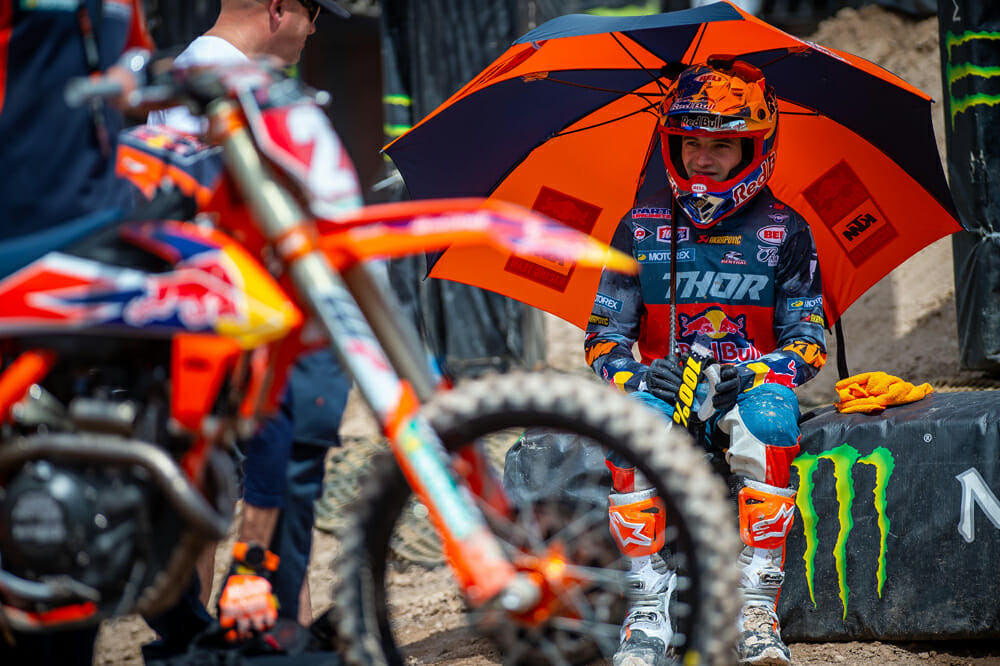
“Just to achieve a win, my first ever win, even though it wasn’t a true main event, it was the Triple Crown main event, it was a confidence-booster in itself,” Webb says. The rest of that night, I won the second one, and to start the third one I was definitely nervous. I think I still got third, which was enough for the win. I gained confidence in that first one, then with the second main going out and winning straight up, that was the confidence I had from the first race already showing immediately, in my opinion. It was a huge night and a huge moment for me.”
But, again, very few racers will admit they were nervous before a race, even though basically all of them are. When asked about why he’s so comfortable admitting he was nervous, he says, matter-of-factly, “I was. I try not to beat around the bush. I think we’re all nervous. We’re all in situations that creates nerves or creates pressure. How you deal with it, I think is, in my opinion, half of being a racer. When the pressure is on, how you perform. That’s why I race. That’s part of being competitive.”
He likes the challenge. He thrives on it.
“I think, for me, as a racer, my favorite part is racing,” Webb says. “Challenging yourself and being under the lights or in front of a crowd. Not only proving it to yourself, but going out and trying to perform with the best people in the world. I think that’s what’s so exciting about racing—that surprise element. You can practice like no other and be the best guy ever practicing, or whatever the case may be, but it’s a whole other game once the gate drops. My dad always told me, ‘Once the gate drops, the bullshit stops.’”
Breakthrough
To start the 2019 AMA Supercross Series, there’s always a large press conference prior to Anaheim 1, the opening round of the series. In early January, 2019, there were 11 racers included in the pre-race press conference, and Cooper Webb wasn’t one of them.
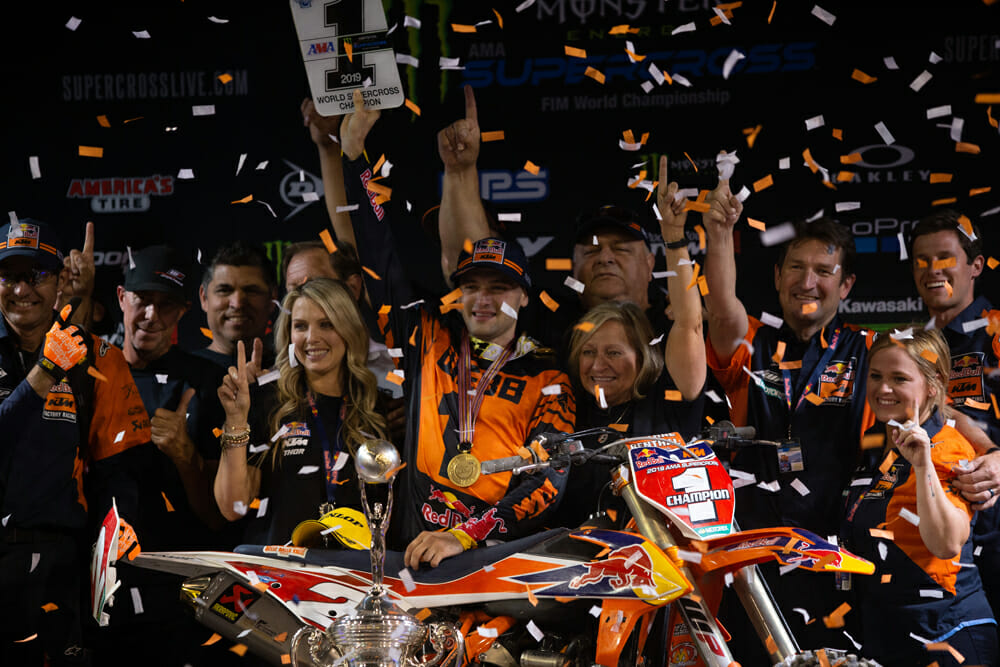 Cooper Webb wasn’t even invited to the Anaheim I Supercross pre-season press conference this year. Guess who will be guest of honor next year?
Cooper Webb wasn’t even invited to the Anaheim I Supercross pre-season press conference this year. Guess who will be guest of honor next year?
“I think at the time, I didn’t think much about it,” Webb says. “It is crazy to look back. I think there were 11 people or so, basically half the main. The 450 class is stacked. Obviously, I guess I was probably the biggest guy—I ended up doing well—that wasn’t in it, but I’m sure there were multiple other ones, too. I think at the time it didn’t bother me. I wasn’t really in a position where I should have been there, either. For me, it’s kind of funny and cool to look back about the 2019 season. It’s pretty ironic to look at that and how it all unfolded and be like, ‘I wasn’t even there!’ So, I think it just kind of shows you how unpredictable my career move to KTM really was.”

An oft-repeated adage maintains that if we knew who was going to win before the gate was dropped, there’d be no point in dropping it.
“That’s the beauty about racing,” Webb says. “Every year, you really never do know. That’s what makes Saturdays so exciting; the surprise aspect of it. Especially the A1 race. It’s usually a crazy night with crazy winners. You kind of get to see everything and it’s all-new. It was just unexpected [for Webb to be up front], I guess.”
Anaheim 1 went pretty well for Webb, all things considered. It was a mud race, and he fell in the first turn, but he finished fifth after recording the fastest lap time of the night. Webb’s fastest time, a 1:02.4 on lap 12 of 20, was the only time in the 1:02 range, and the only racer who had a single lap within a second of Webb’s time was eventual winner (and former teammate) Justin Barcia, who put down a 1:03.3 on lap two, when the track was in much better condition.
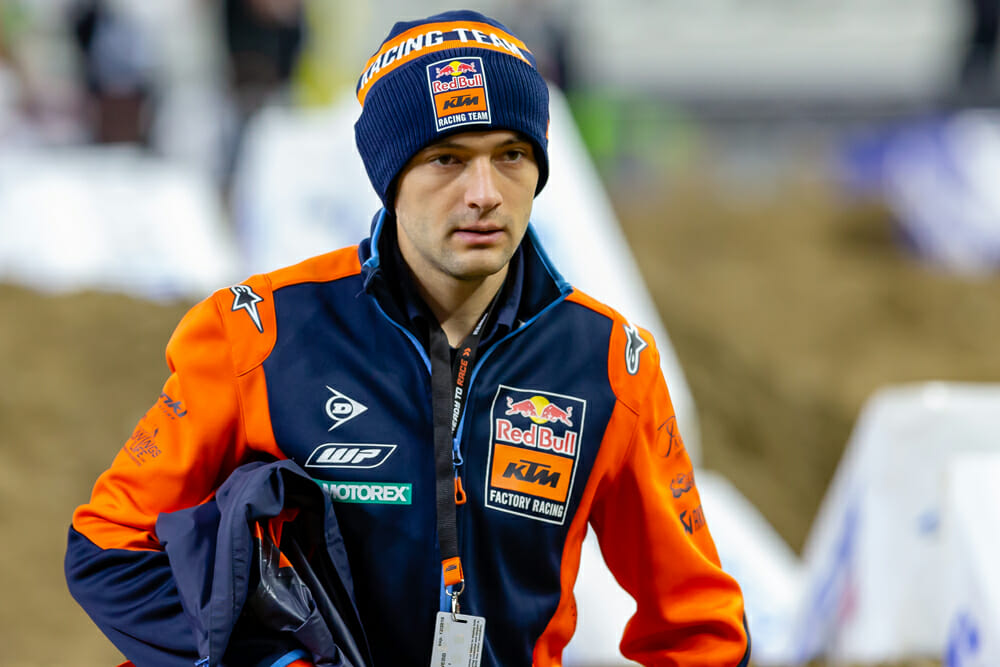
“I think A1, for me, was actually a confidence-booster,” Webb says. “It was a mud race, but at the time I had fallen in the first turn. In qualifying, I was actually top-five, which I was super stoked on. Then I crashed in the first turn and came back all the way to fifth. It was a mud race, so it’s hard to really tell where you’re at. But I guess I ran the fastest lap of the race. I think it was such a change for me going to KTM and being at Aldon’s [Aldon Baker’s training facility, the Baker’s Factory], to line up for the first one, for me a fifth was like a win at that time. The second race was my worst result of the year [10th place, with no crashes, well off the pace], and then A3 was the Triple Crown. I just got a good start and put myself in a good position. I think the biggest thing for me mentally was just racing up front and being between Kenny [Roczen] and Eli [Tomac]. I think that was the biggest thing. Whether I would have passed [Roczen] or not [to win the first main event], that alone was the confidence-booster of knowing this is what it’s like to run up front; this is what it’s like to be up with the title contenders. I felt like I kind of made a charge there at the end. I was right there hoping to capitalize on a mistake. I think obviously the mistake was made, but as soon as the mistake was made, I felt like I capitalized immediately. Probably even without that mistake I was going to try to make the pass there. I probably wouldn’t have been close enough. But when he did make the mistake, it opened it right up.”
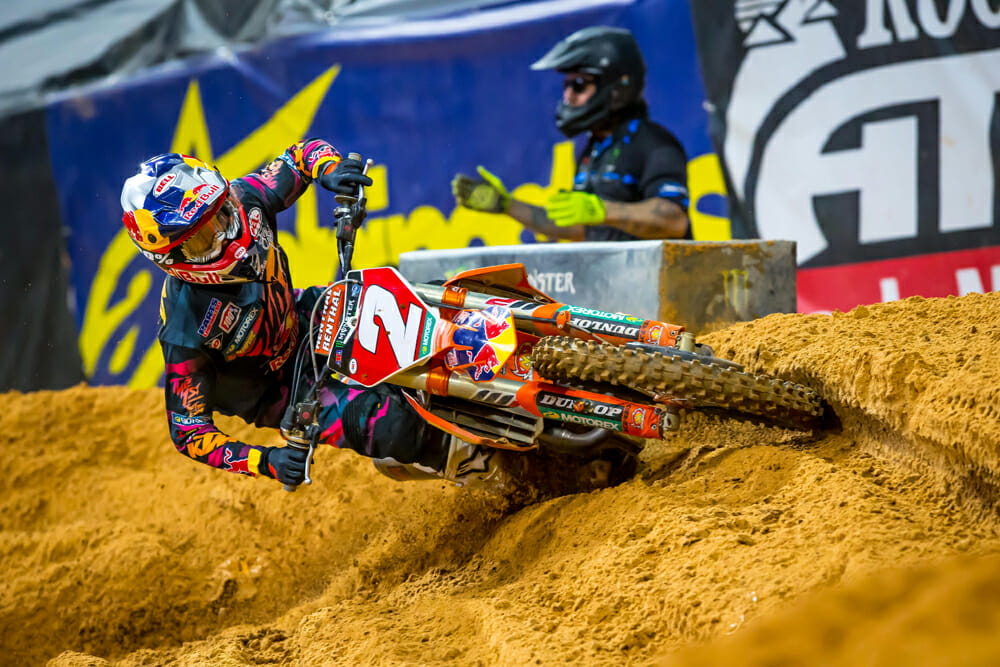
And the rest, as they say, is history. Webb went on to win the second main, and the overall, then win four of the next six rounds. With the title pressure on the line and six wins in his pocket, he went to the penultimate round of the series, in New Jersey, with an 18-point lead over a surging Eli Tomac, who won the previous two races. Another loss to Tomac would mean a maximum 15-point lead going into the Las Vegas finale, which is a lot, but not enough to keep him very comfortable at the final round.
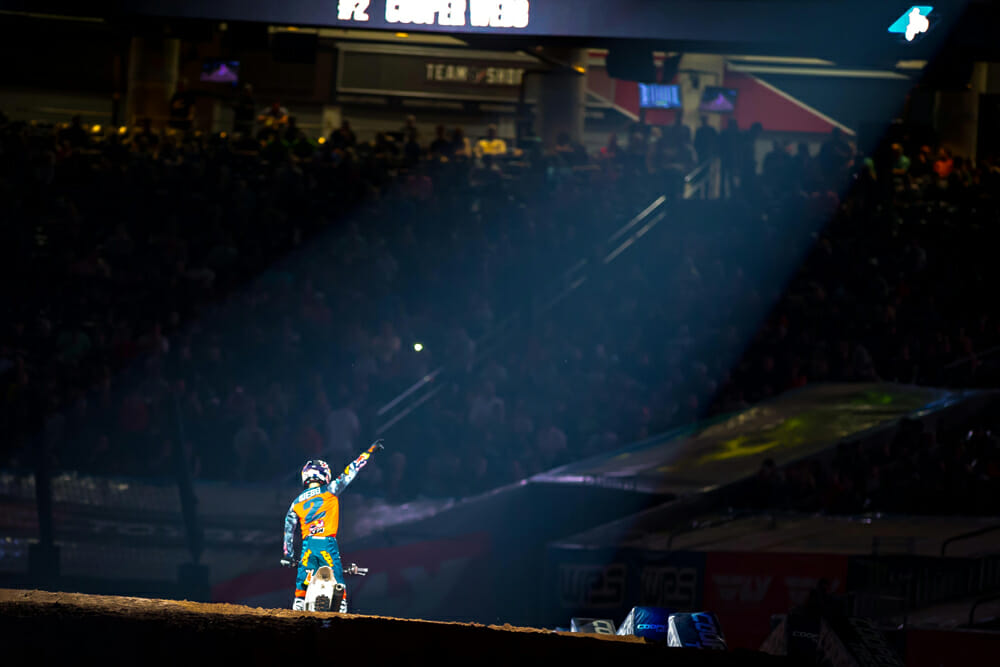
In the New Jersey main event, Webb again excelled under pressure and grabbed the holeshot. Tomac eventually went by, but Webb kept him honest until Tomac crashed out of the lead. Then Webb had to fight off Zach Osborne, who took the lead, then handed it back to Webb when he hung himself up in a corner.
Through it all, Webb stayed solid, despite the pressure, and won the race, which sent him to Las Vegas with a 23-point lead. And that meant all he had to do to win the title was finish inside the top 20. He finished third, ending the season with seven wins and 13 podiums, and the title.
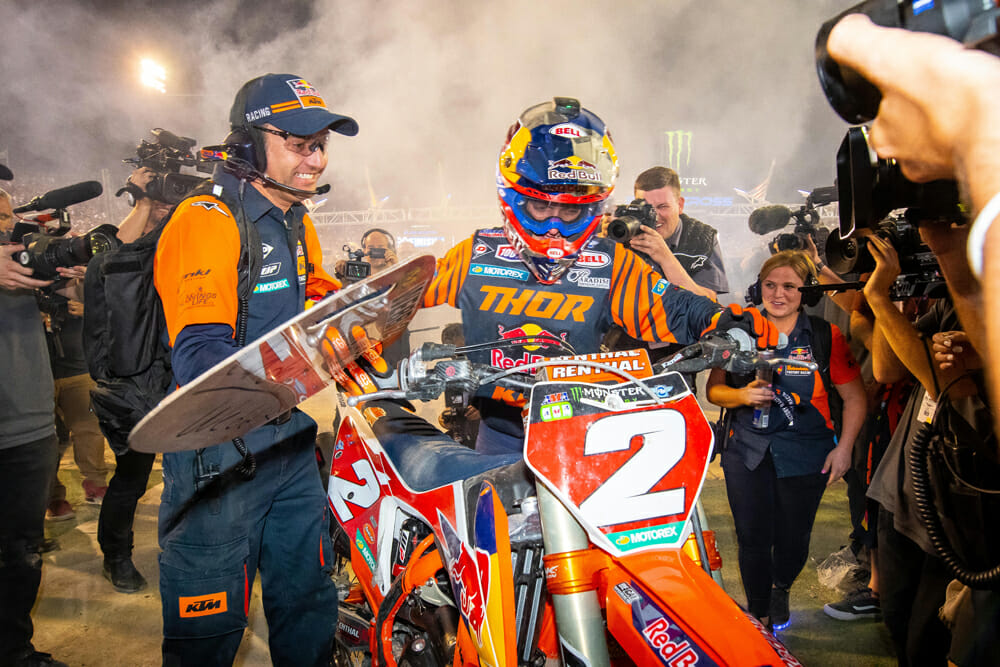
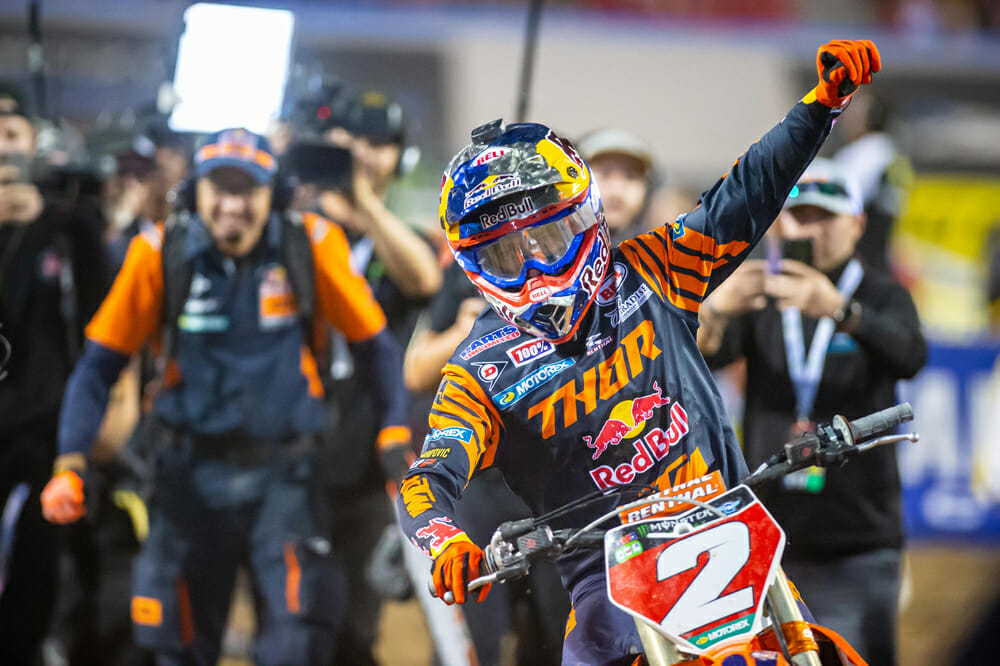
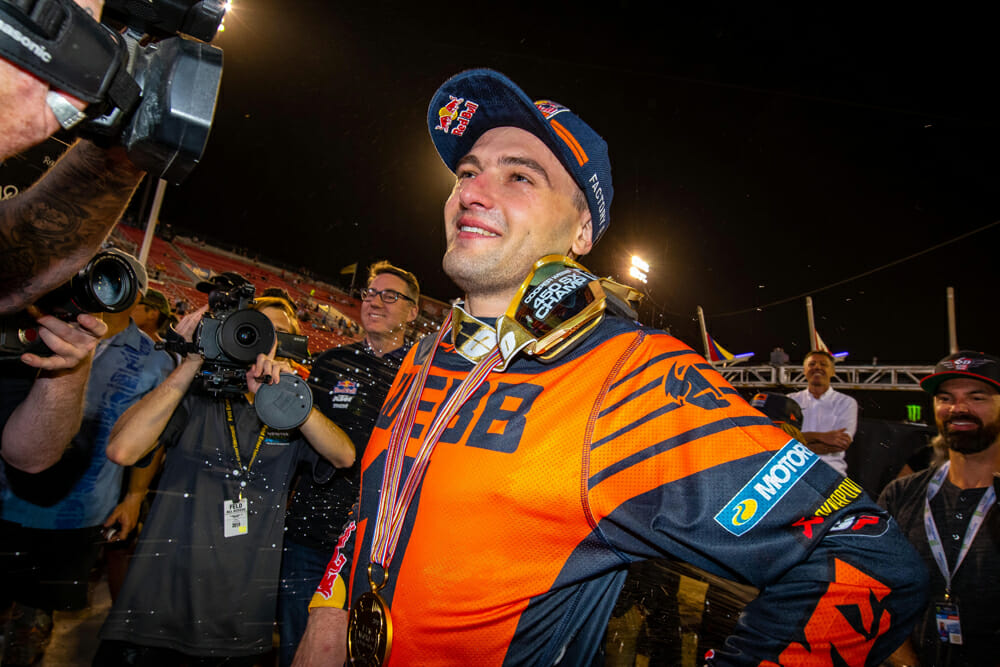
Although he’s a former 250cc National MX champ, Webb has always been a little more natural at supercross, and he got into the nationals a little bit off his game a couple weeks after winning his first 450cc title.
“I think it was one of those things where we were worrying about the supercross championship, honestly, that was our main priority,” Webb says. “Not that there’s always a ton of time to test for outdoors anyway, but I put supercross first for sure. It’s one of those things where, what do you do? I just achieved a life dream on a Saturday night after not only 18 weekends, but all the way back to September. I had been at it for basically six months. We felt like I needed a little refresher and to take a few days off after Vegas and really soak in the moment. Then it’s like, okay, by the time you get back onto things, you got a week before Hangtown. I think, for me, the KTM was great right away, but there’s certain things that as racers you just prefer. Even in supercross, I felt like I didn’t come around with the exact bike setup that we raced with until honestly late December. It was right around Christmas. And the only thing we had done was supercross testing. I rode one day of outdoors when I first got on the KTM. So we were definitely a little behind in that program. I think that was a little bit of it. Outdoors is just another beast.”
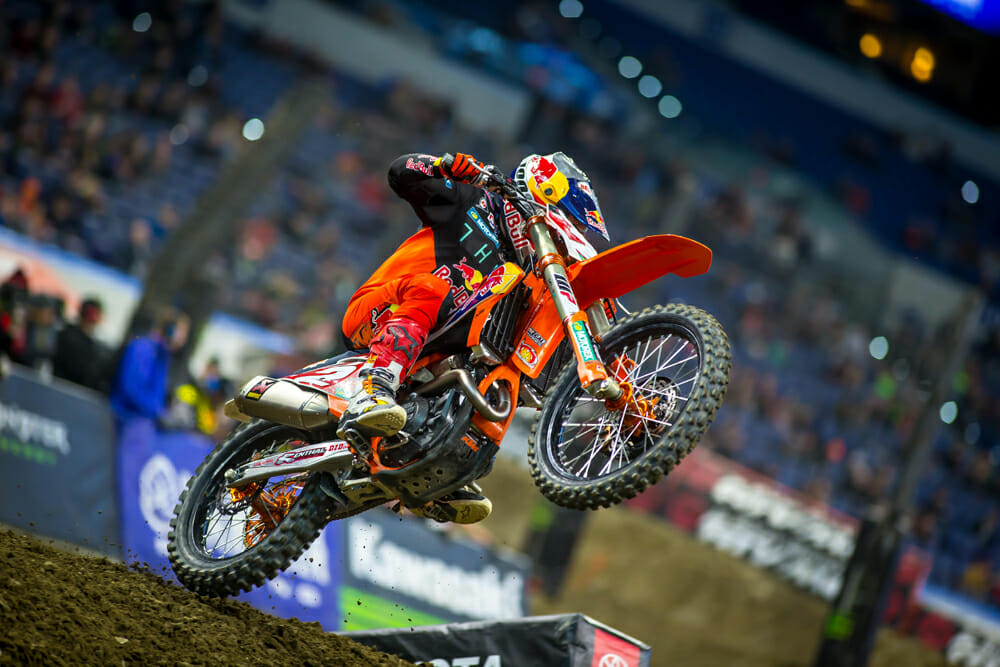
Still, once again, Webb steadily improved, but struggled to put two motos together. He grabbed a handful of moto podiums without a single overall podium, but that turned around at Millville (round eight), where he won both motos in dominant fashion. But he got hurt soon after and his season was over.
“I felt like my season progressively was getting better each weekend,” Webb says. “Ultimately, finally getting—actually, I had never got on the podium, and I went out in Millville and went 1-1. So that was a huge step. Then, two weeks later, I raced Washougal, and then got injured at Unadilla, which was kind of a bummer. But at the same time, it was one of those things where luckily it wasn’t worse. I think we just finally got a good handle on things. But it is tough. Outdoors the tracks are so different. There’re so many different elements every weekend that you strive to try to get a good base setting, but then it just changes so much. Then we’re behind on motos, so you want to play catch-up on the motos but then how much testing do you do? It’s a tough line, but it’s nice to kind of learn from mistakes. I think this year we will be a lot more on it. Looking back, I don’t think we could have done it any other way. Supercross was the important part. That was the goal. Nothing else mattered at that point. It’s definitely a tough turnaround.”
But considering that Webb thought 2019 was going to be a building year for him to get used to training with Aldon Baker, and get used to his new motorcycle and his team, to come away with a supercross title and an outdoor 1-1 win was far beyond expectations.
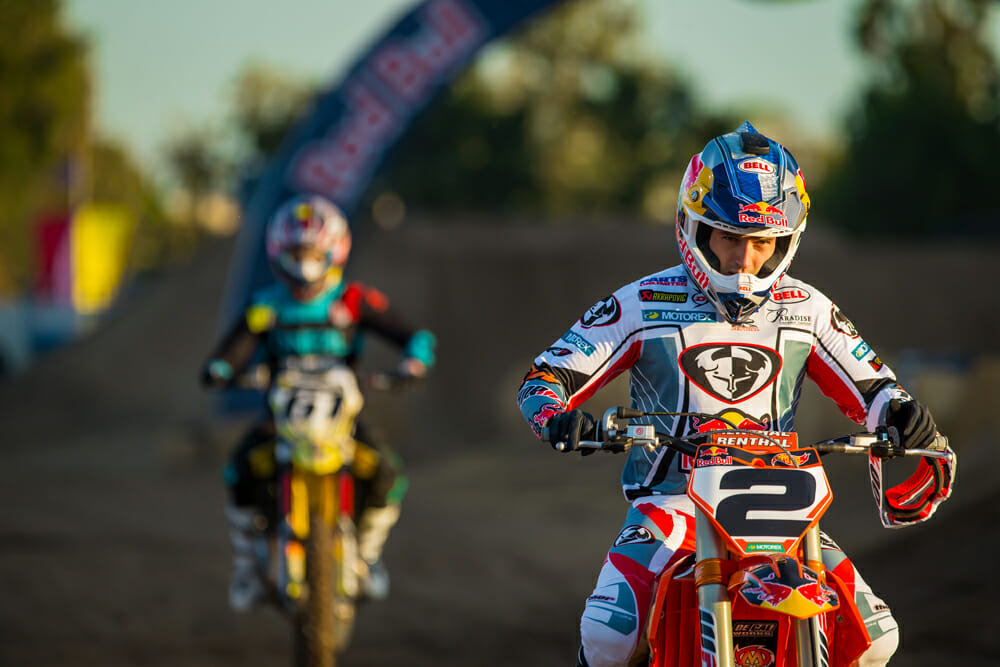
The A-Team
The first piece of the 2019 championship puzzle came when Webb signed with Red Bull KTM.
“It was an eye-opening experience just seeing how committed they were with their testing and bike setup and how much not only Roger [DeCoster] and Ian [Harrison] do, but the mechanics to the suspension guys,” Webb says. “Everybody on the team was so educated on the motorcycle and so in-tune with it. Definitely, I’ve learned a lot being around those people that are just so dang smart. I’ve learned a lot from them.”
And then there’s Aldon Baker’s program.
“The training was a whole new ballgame for me,” Webb says. “It was something that, quite frankly, coming in I wasn’t sure about. I wasn’t sure if I could handle it. Getting here [Florida] and getting the first year down and dusted was really an accomplishment in its own. I felt like I gave it my all every day and learned a lot. Obviously, my fitness was at an amazing level this year. That’s something that I’m stoked about, and that’s something that I felt like coming to KTM that I could be better at was my fitness.”
And now Webb is headed into his second year on the same motorcycle, and Baker has always said that racers who train with him don’t achieve their peak fitness until their second year.
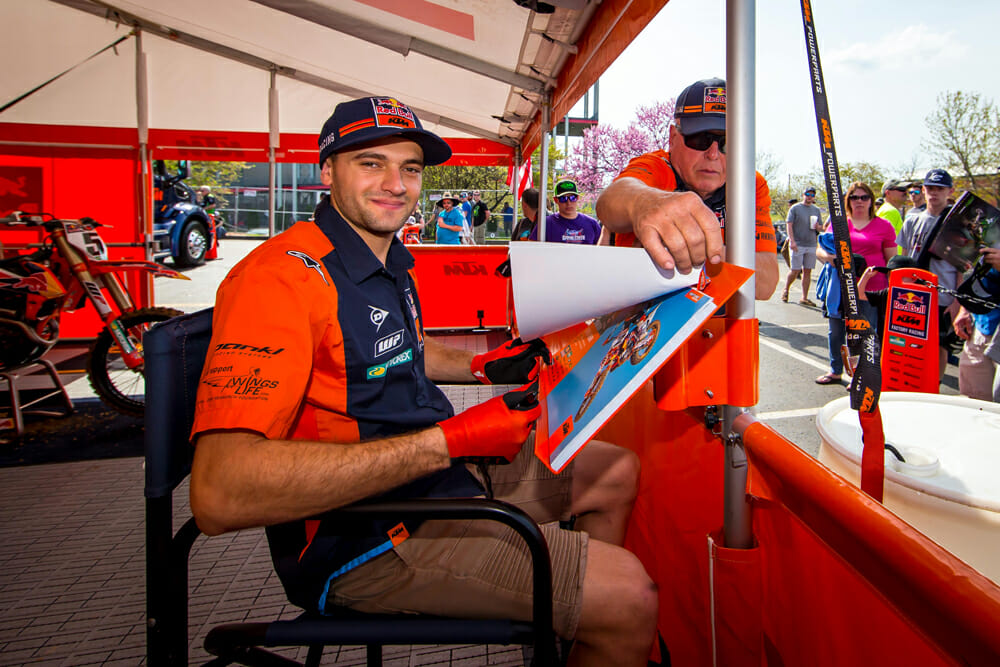
“Coming into year two just kind of having a base setup, knowing a good starting point and knowing where we can be better and kind of understanding the way that KTM works—the good, the bad of the bike—and just kind of understanding it more, that’s huge,” Webb says. “Coming in just with the training aspect, another year stronger, in theory, being with Aldon, I’ve been able to train with him for a year. And kind of being in that routine for a year, and know kind of what to expect and can actually hopefully get stronger with more time. So that’s exciting. Racing-wise, I think it was a huge experience year for me, from top to bottom. The way the year happened was insane in itself, but coming into this year knowing now that not only have I won a championship and believe it, but that was my first time ever doing 17 supercross races, too. So, to be able to really just check that box and know what it’s like to go a full season, to go to all these different venues and different track conditions, what it’s like to travel every weekend and fight sickness or little injuries or this and that through a season, ultimately how to manage a championship in a sense, or even to win a championship… I felt like I got five years’ of racing experience in one. I get to build off that. I just turned 24, so I feel like I have a lot of time to hopefully progress.”
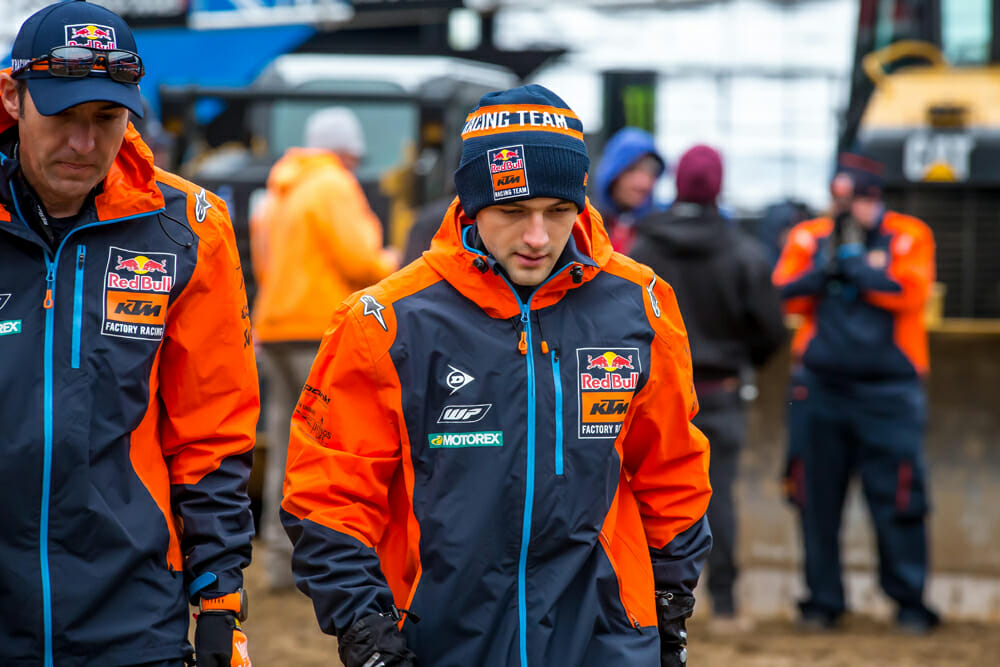
He didn’t mince words to start the year, telling people it was a building year, so if that’s true, watch out.
“It’s funny; looking back, I’ve told everybody that asked, but last year was strictly a learning year,” Webb says. “It really was a learning year. It started when I first got here. How to train at that level, how to ride at the level of all the guys at the Baker’s Factory every day, and how to manage the season. Everything was really a learning experience. It was cool to kind of start from, I wouldn’t say scratch, but to be up front and absorb all the knowledge and everything that I have around me and just kind of do what I was told and just see how it worked out. It was pretty amazing.”
The Teammate Challenge
Coming into 2019, Webb was definitely considered the “number-two guy” on the Red Bull KTM team behind 10-year team veteran Marvin Musquin. But before he signed with KTM, Webb had quite a few run-ins specifically with Musquin on the race track. He also had just experienced a pretty contentious teammate situation in his final year at Yamaha, where his team picked up Justin Barcia and the two racers butted heads a lot. It was obvious Webb wasn’t happy, and Barcia was beating him much of the time.
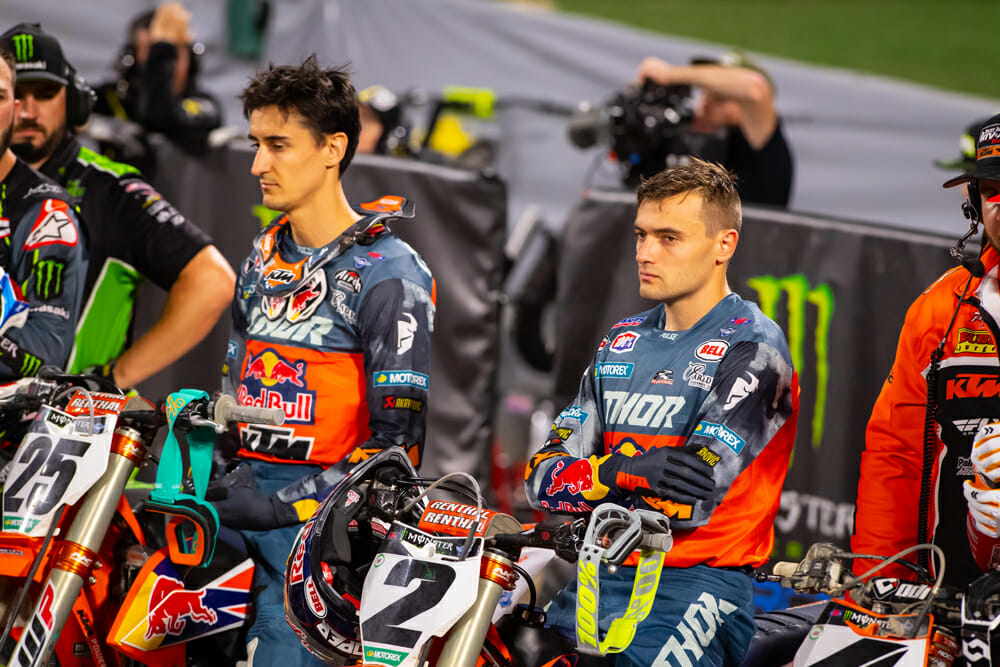 There is just as much, if not more, rivalry between Webb and his Red Bull KTM teammate Marvin Musquin (left) as there is between Webb and the rest of the supercross championship contenders.
There is just as much, if not more, rivalry between Webb and his Red Bull KTM teammate Marvin Musquin (left) as there is between Webb and the rest of the supercross championship contenders.
Every racer, if they’re honest, will tell you that the number-one thing you have to do at the factory level is beat your teammate. The top guy on a team will usually be retained when contract time comes around, but the next guy is much more uncertain. But at least at KTM, Webb wasn’t expected to be the top guy. Expectations change things.
“I actually like Justin [Barcia],” Webb says of his 2018 Yamaha teammate. “We get along great. As a competitor, you always want to try to beat your teammate. I think it was a position where he came in with a lot to prove and was riding really well. He really beat me quite often. I came in that second year pretty under-prepared with some off-season injuries. Then as the season kind of got going, I came around a bit better. Then I got to a point where we were kind of dicing it up a lot. So it is tough. You want to do the best you can as yourself, but you also want to do well for your team, in a sense. So it’s tough. He is a very aggressive rider. There were definitely some run-ins. We raced hard. I think a lot of it for me was just maturing. I think I was a little immature and kind of held onto things and didn’t just race forward.”
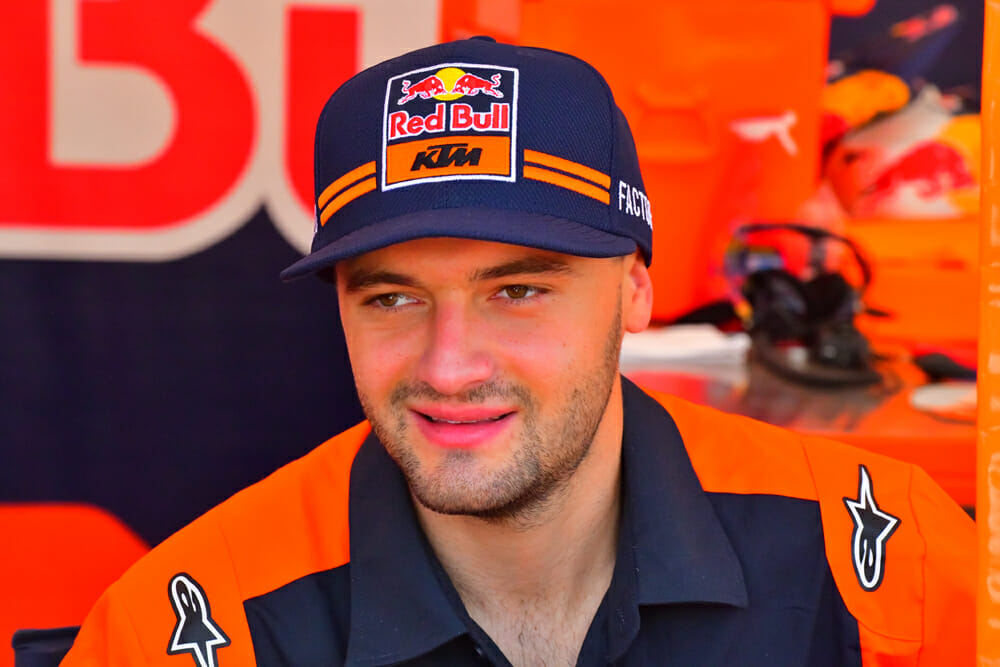
And it’s obvious just by talking to him that Webb has matured a lot over the past year or two.
“You’re going to have run-ins,” Webb said. “You just kind of move forward and don’t let that affect you or ruin your night, and I think you’re better off. That’s something that I learned from being on KTM and being down here. It’s hard sometimes, but you’ve got to swallow your ego and accept it. I had to do that when I first came here [to the Baker’s Factory]: I had to talk to Marv [Musquin] and just apologize for the past, and I told him I’m going to try to be the best teammate I can be. My biggest thing is letting him know that I have a lot of respect for him. Obviously, I do, after especially I won that first race and we became title contenders. I knew it was going to be a difficult transition into that.”
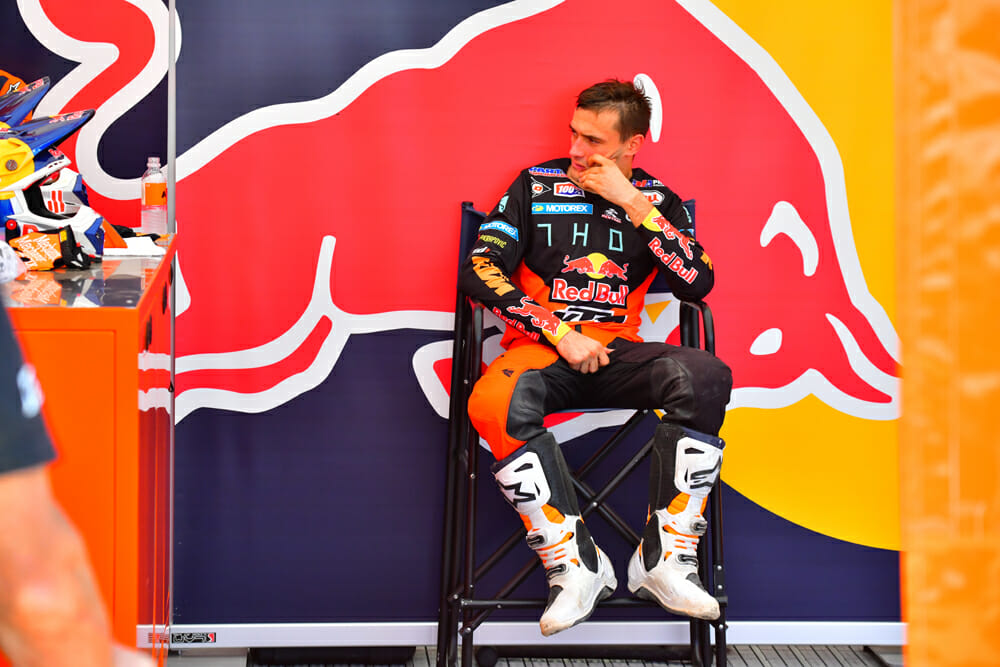
Webb is well aware of how he was perceived on the team when he showed up, and the potential for animus between teammates who are competing for a title is incredibly high.
“I think at the beginning of the year it was pretty well-known that I was the secondary guy, and I’m here to try to get some top fives and maybe some podiums, but it’s Marv’s team, and that type of deal,” Webb said. “I don’t think it’s really like that, though. I think it’s what a lot of people think. Personally, I like it. In the 250 class, me and Jeremy Martin were always teammates. We always had respect for each other, but I felt like it made us better riders. Being teammates, we were always raising the bar on each other. There were a lot of things that I did great, and there were a lot of things that he did great. I think that’s similar to how it is with Marv and I now. We’re with each other training and riding every day and we get along and that’s great, but there’s still our competitive side where we both want to win and achieve our goals. So it’s a tough line, but I think that it’s raised our level, in my opinion. He is a great rider and there’s a lot of things that I can learn from him, and I feel like vice versa; there’s stuff that maybe I do well that he can learn from. So it doesn’t work for everybody and it is a tough thing. I think as a racer you always want a teammate that’s never a threat, but at the end of the day, I don’t think that makes you a better racer.”
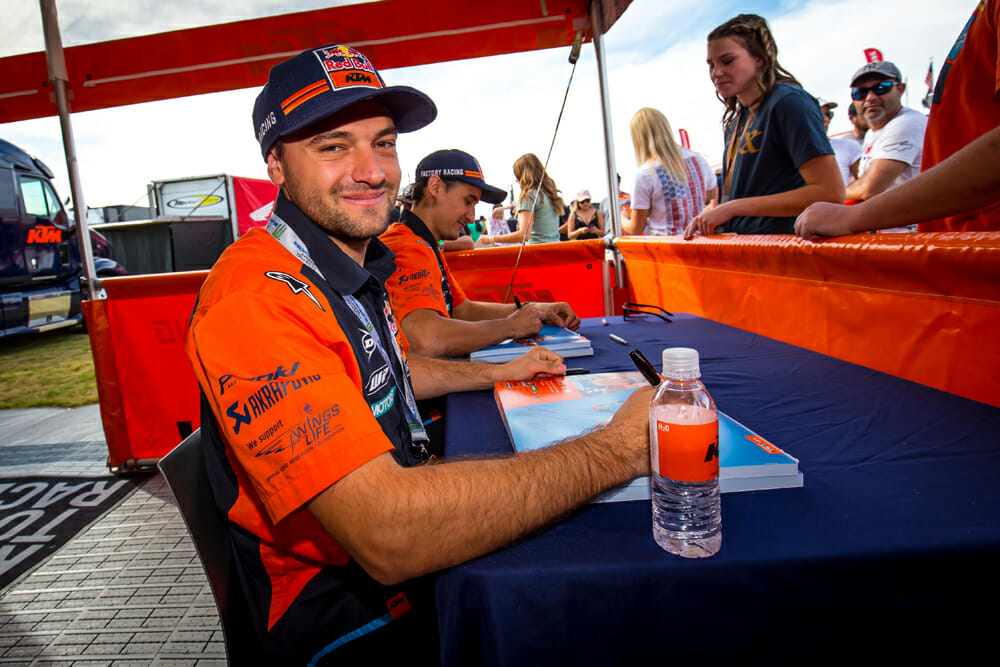
Where To From Here
Webb has defended a championship in the past, in the 250cc class, with almost identical results between 2015 and 2016. That’s not uncommon as the 250cc class is split into two coasts and the field isn’t quite so deep. But defending a title in the 450cc class is another thing altogether. And, as is typical for Cooper Webb, he really looks forward to the challenge and plans to face it, like he does everything else, head-on.
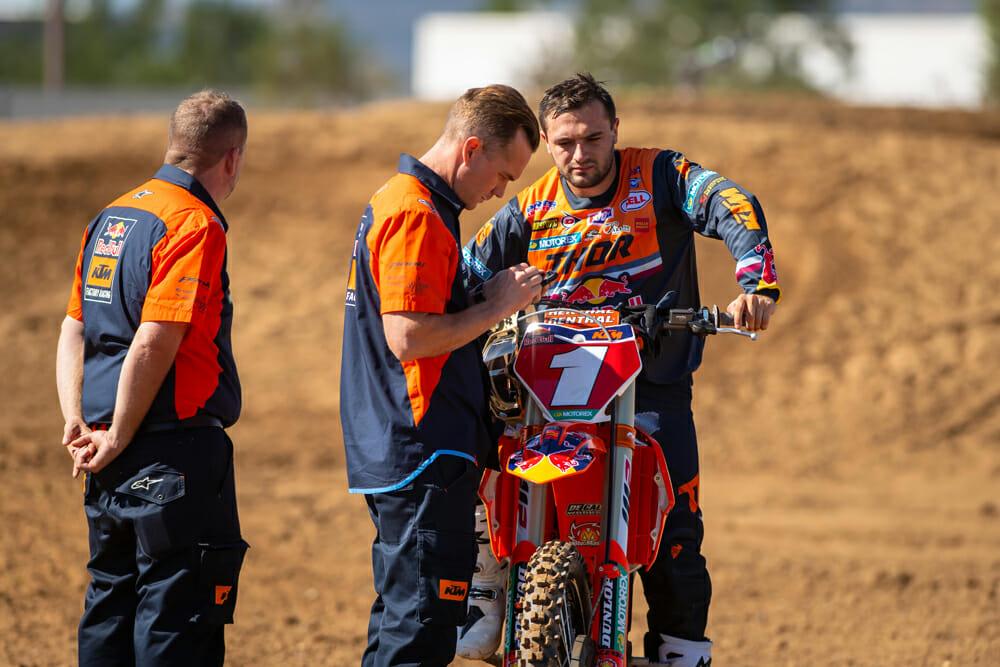 Once Webb has his confidence, he’s hard to beat.
Once Webb has his confidence, he’s hard to beat.
“It’s never going to get easier,” Webb says. “I think this year is totally different than last year, and it’s a new approach; it’s a new everything. Last year, getting back to the beginning of our interview, there was no expectation and now there’s tremendous expectation. I don’t really mind that. I think it’s part of it. I think being a champion does come with expectations. It’s something that you have to deal with and work on. I’m looking forward to that. I really am. Obviously, I think everybody is going to be a year stronger and a year better and learn from their mistakes. I’m hoping, for me, this is my second year on the bike and with the team and just being more comfortable and I think my fitness being better, and also I was able to achieve that championship last year and I know what it takes to ultimately do that. So I think, for me, the confidence is pretty high, but also just the mindset of knowing that I’ve done it and what it takes. I kind of have an idea now. So, the championship is the goal, but I think I’m going to go in like last year and just do the best I can and try to be up there every race. Whatever happens, happens. I’m looking forward to this year, for sure. Every weekend is going to be a different scenario, so I think just putting yourself in the best situation every weekend is what’s important.”
Hey, it worked already once, right?CN
